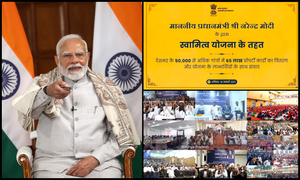India’s 'SVAMITVA' scheme in focus at World Bank Land Conference in US
By IANS | Updated: May 7, 2025 17:12 IST2025-05-07T17:05:02+5:302025-05-07T17:12:36+5:30
New Delhi, May 7 India took centre-stage at the prestigious 'World Bank Land Conference 2025' in Washington, DC, ...

India’s 'SVAMITVA' scheme in focus at World Bank Land Conference in US
New Delhi, May 7 India took centre-stage at the prestigious 'World Bank Land Conference 2025' in Washington, DC, reaffirming the country’s global leadership in inclusive land governance and grassroots empowerment.
Participating as a 'Country Champion' in the plenary session, Vivek Bharadwaj, Secretary, Ministry of Panchayati Raj, articulated India’s leadership in land rights, tenure reforms, and technology-driven spatial planning, the Ministry of Panchayati Raj said in a statement on Wednesday.
Under the leadership of Prime Minister Narendra Modi, India’s pioneering 'SVAMITVA' scheme (Survey of Villages and Mapping with Improvised Technology in Village Areas) has emerged as a transformational initiative in rural land governance.
Bhardwaj emphasised that India has surveyed 68,000 square kilometres of rural land under 'SVAMITVA', unlocking $1.16 trillion worth of assets, thereby offering millions of rural families legal title, dignity, and access to credit and opportunity.
Through anecdotes of individuals like a dairy farmer in Madhya Pradesh who expanded his business, or a mother in Rajasthan who funded her daughter’s overseas education, he highlighted how land ownership is being converted into real empowerment.
Bharadwaj shared deep insights into the scheme’s journey -- beginning with onboarding states, amending state laws and survey rules, and establishing critical technological infrastructure like Continuously Operating Reference Stations (CORS) to enable accurate drone-based mapping. He explained how India’s federal structure requires strategic cooperation, coordination, and community involvement to drive reforms on a national scale.
The special event, scheduled for Wednesday (US time) and titled “Securing Land Rights for a Billion People,” was set to further amplify India’s model of inclusive and technology-driven land governance.
Led by the Ministry of Panchayati Raj, the session will open with welcome and opening remarks by Dr Klaus W. Deininger, Lead Economist, World Bank, followed by an introduction by Somik V Lall, Senior Advisor, DECVP, World Bank.
The event will spotlight the design, impact, and scalability of the 'SVAMITVA' scheme, with presentation by Vivek Bharadwaj. An interactive Q&A session will follow, reflecting the growing global interest in India’s transformative approach to rural land governance.
The side event will be attended by all delegates of the 'World Bank Land Conference 2025', including advisors and senior advisors to seven executive directors representing regions across Africa, Latin America and the Caribbean (LAC), Central Asia, South Asia, and South East Asia, offering a valuable opportunity for cross-regional dialogue and exchange.
The event will provide a focused platform to discuss the implementation methodology and transformative benefits of the SVAMITVA Scheme with countries that share similar land administration systems.
The objective is to explore avenues for collaboration, enabling the Ministry of Panchayati Raj to support and partner with these nations in adopting and adapting similar models in their respective contexts.
On Thursday, the focus will be on 'Gram Manchitra' (India’s advanced GIS-based spatial planning platform). Alok Prem Nagar, Joint Secretary, Ministry of Panchayati Raj, will present how the platform is facilitating spatially informed decision-making at the Panchayat level, showcasing the integration of cutting-edge technology with grassroots governance to foster sustainable, resilient, and self-reliant villages.
Through its presence at the 'World Bank Land Conference 2025', India has been positioned as a global thought leader in land tenure reforms, rural development, and inclusive governance demonstrating that a data-driven, people-centric approach can effectively bridge centuries-old land insecurity and usher in a new era of legal recognition, dignity, and prosperity for rural citizens.
Disclaimer: This post has been auto-published from an agency feed without any modifications to the text and has not been reviewed by an editor
Open in app